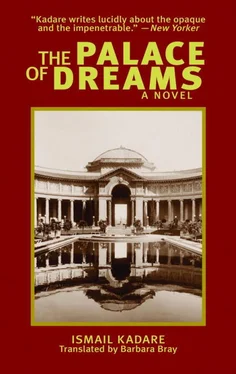Every so often as he sat at his desk, he would feel his head grow heavy, and wonder at the pages already written as if it had been someone else who’d penned them. There before him lay the melancholy aggregate of the sleep of one of the vastest empires in the world: more than forty nationalities, representatives of almost all religions and of every race. If the report had included the whole globe, it wouldn’t have made much difference. To all intents and purposes it covered the sleep of the entire planet—terrible and infinite shadows, a bottomless abyss from which Mark-Alem was trying to dredge up a few fragments of truth. Hypnos himself, the Greek god of sleep, couldn’t have known more than he did about dreams.
One afternoon he got his family’s Chronicle out of the library. The last time he’d looked at it was that cold morning when, newly appointed, he was about to present himself for the first time at the Palace of which he was now virtually the Director. As he turned the pages he still wasn’t sure what he was looking for. Then he realized he wasn’t looking for anything. All he wanted was to get to the blank pages at the end…. It was the first time it had ever occurred to him to add something to this ancient chronicle. For a long while he sat still, gazing at the ledger. Important things had been happening. The war against Russia was just over. Greece had left the Empire, and the rest of the Balkans was in turmoil. As for Albania… It grew more and more distant and dim, like some far cold constellation, and he wondered if he really knew anything about what went on there…. He sat there uncertainly, his pen growing heavy in his hand, until finally it rested on the paper and instead of writing “Albania” wrote: There. He gazed at the expression that had substituted itself for the name of his homeland, and suddenly felt oppressed by what he immediately thought of as “Quprilian sadness.” It was a term unknown to any other language in the world, though it ought to be incorporated in them all.
It must have been snowing… there…. Then he stopped writing, snatching away the pen as if afraid it might be held to the paper by magic. It was with an effort that he went on to record, in the succinct style used in the rest of the Chronicle, the death of Kurt and his own appointment as head of the Palace of Dreams. Then his pen was still again, and he thought of the distant ancestor called Gjon who on a winter’s day several centuries before had built a bridge and at the same time edified his name. The patronymic bore within it, like a secret message, the destiny of the Quprilis for generation after generation. And so that the bridge might endure, a man was sacrificed in its building, walled up in its foundations. And although so much time had gone by since, the traces of his blood had come down to the present generation. So that the Quprilis might endure…
Perhaps that was why—like the ancient Greeks, cutting off their hair at a funeral so that the angry soul of the departed wouldn’t be able to recognize them and do them harm—perhaps that was why the Quprilis had changed their name to Köprülü: to avoid being identified with the bridge.
Mark-Alem knew all about this, but remembered how on the fateful night he had longed to throw off the protective mask, the Islamic half-shield of “Alem,” and adopt one of those ancient names that attracted danger and were marked by fate.
As before he repeated to himself: Mark-Gjergj Ura, Mark-Gjorg Ura… still holding the pen poised in his hand, as if uncertain what name to append to the ancient chronicle….
Late one afternoon in March he finished the report, and sent it to the copyists’ office to be transcribed. Then, with some relief, he went out to his carriage to drive home. He was in the habit of shrinking back in his seat so as not to be seen by passersby in the often crowded streets. He huddled up in the corner again today. But after he’d gone some way he felt curiously drawn toward the carriage door. Something beyond the window was calling him insistently. Eventually he broke with his custom and craned forward, and through the mist made by his breath on the glass he saw he was driving past the central park. The almond trees are in bloom, he thought. He was moved. And though he almost shrank back in his corner again, as he usually did at once after something outside had attracted his attention, he now found himself unable to do so. There, a few paces away, was life reviving, warmer clouds, storks, love—all the things he’d been pretending to ignore for fear of being wrested from the grasp of the Palace of Dreams. He felt that if he was crouching there it was to protect himself, and that if ever, some late afternoon like this, he gave in to the call of life and left his refuge, the spell would be broken. The wind would turn against the Quprilis and the men would come for him as they’d come for Kurt, and take him, perhaps a little less unceremoniously, to the place from which there is no returning.
But despite these thoughts he didn’t take his face away from the window. I’ll order the sculptor right away to carve a branch of flowering almond on my tombstone, he thought. He wiped the mist off the window with his hand, but what he saw outside was still no clearer; everything was distorted and iridescent. Then he realized his eyes were full of tears.
Tirana 1981
Born in 1936 in the Albanian mountain town of Girokaster, near the Greek border, Ismail Kadare studied in Tirana and at the Gorki Institute, Moscow. He is Albania’s greatest living poet and novelist, whose works have been translated worldwide. He established an uneasy modus vivendi with the Communist authorities until their attempts to turn his reputation to their advantage drove him in October 1990 to seek asylum in France, for, as he says, “Dictatorship and authentic literature are incompatible…. The writer is the natural enemy of dictatorship.”
The Palace of Dreams, which appeared in Albania in 1981 and was immediately banned, arose out of Kadare ’s long-nurtured ambition to invent a hell of his own. “I kept weighing up what an ambitious and over-fanciful proposal this was, though,” he wrote, “after those unknown Egyptians, after Virgil, Saint Augustine and, above all, Dante….”
The Concert
Elegy for Kosovo
The File on H.
The Pyramid
Spring Flowers, Spring Frost
The Successor
The Three-Arched Bridge

ARCADE PUBLISHING • NEW YORK
Fifteen hundred copies of the Collector’s Edition of Palace of Dreams have been specially printed on 100 gsm Chinese Yulong Cream paper. Each copy has a ribbon marker, decorative endpapers, and is bound in wibalin with gilt stamping on the cover and spine.
Copyright © 1990, 2011 by Librairie Arthème Fayard
English-language translation copyright © 1993, 2011 by HarperCollins Publishers
All Rights Reserved. No part of this book may be reproduced in any manner without the express written consent of the publisher, except in the case of brief excerpts in critical reviews or articles. All inquiries should be addressed to Arcade Publishing, 307 West 36th Street, 11th Floor, New York, NY 10018.
First published in Albania in 1981 under the title Nepunesi i pallatit te endrrave
Arcade Publishing books maybe purchased in bulk at special discounts for sales promotion, corporate gifts, fund-raising, or educational purposes. Special editions can also be created to specifications. For details, contact the Special Sales Department, Arcade Publishing, 307 West 36th Street, 11th Floor, New York, NY 10018 or info@skyhorsepublishing.com
Читать дальше













